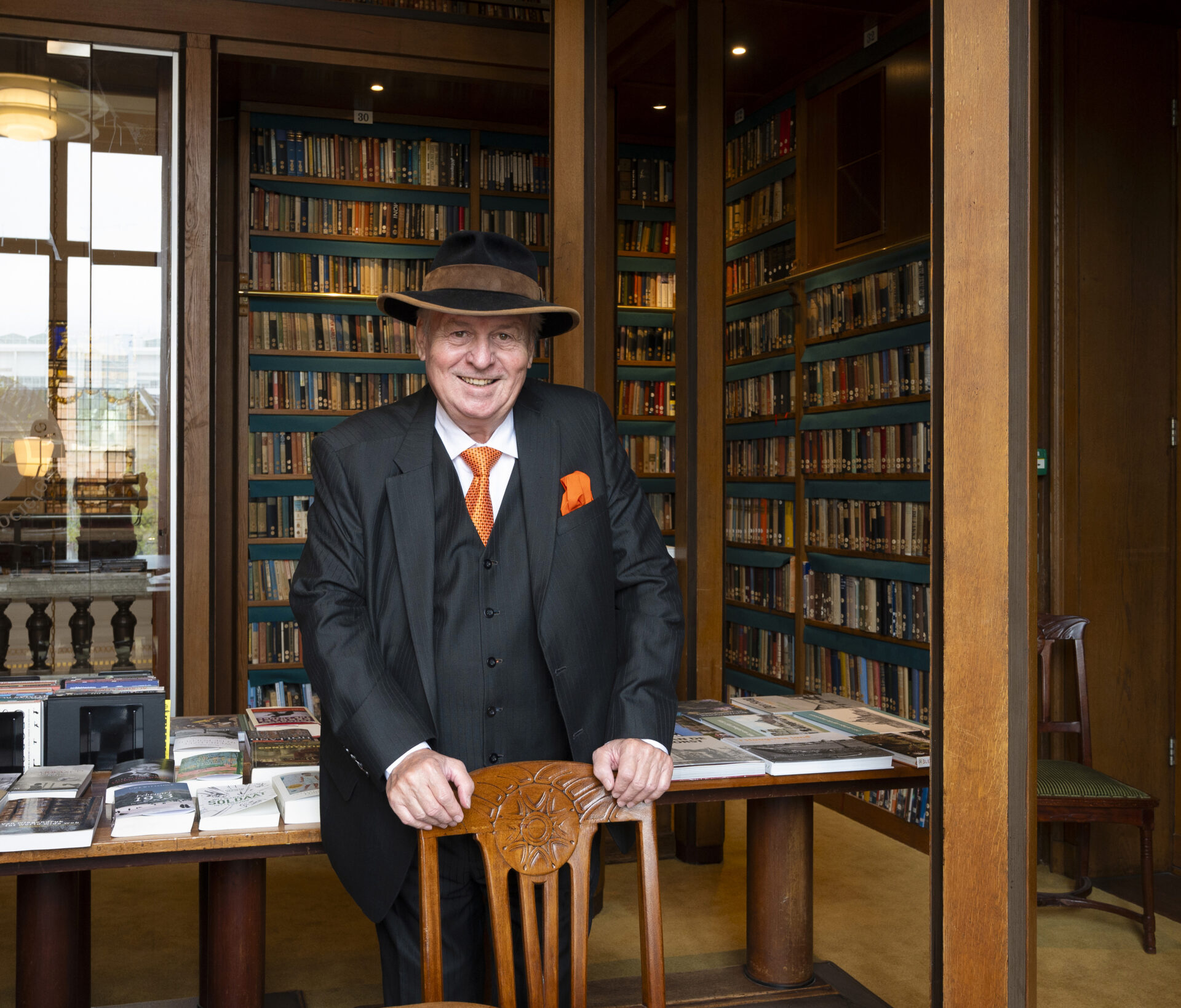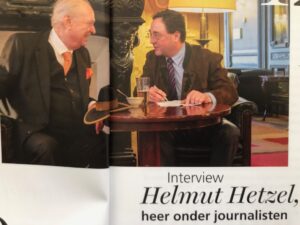HM-HETZELMEDIA
„Heer onder Journalisten“
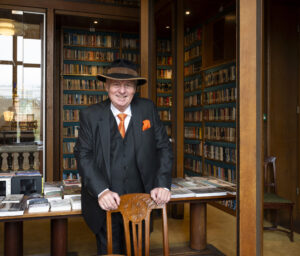
Helmut Hetzel in Societeit De Witte, The Hague
Photo: © Marcia van Bijnen
Helmut Hetzel a master among journalists
Dean of the Foreign Correspondents in The Hague
By Jan Rutger van Zwet
One of the nicest aspects of De Witte is that it attracts people from all walks of life. Civil servants, military personnel, business people, professionals, and others mingle without stepping on each other’s toes. But what about those annoying gadflies of power – the journalists? I’m afraid they are somewhat underrepresented in our ranks. It can’t really be otherwise. The Bommelsaga – that brilliant (laugh) mirror of the familiar Netherlands – teaches us that Argus, correspondent for, among others, De Rommeldamsche Courant, is not a member of De Kleine Club. His boss, the newspaper magnate O. Fanth Mzn., is, of course, a member – even the chairman! Fortunately, our actual Nieuwe of Littéraire Sociëteit has counted Helmut Hetzel among its members for many years. Helmut, born in 1955, has been a correspondent in The Hague since 1985 for a series of newspapers, television, and radio stations. Before that, he studied at the Technical University in Dortmund and was a correspondent in Beijing for a couple of years. His journalistic achievements have been widely recognized – not least in a highly amusing article by his colleague Andra Oprea, which speaks of the ‚Incredible Stories of a Gentleman-Reporter‘.
Moreover, Helmut Hetzel was the first German to lay a wreath on May 4, Remembrance Day. This happened on May 4, 1995, at the Nieuwspoort monument in The Hague. Helmut was then President of the Foreign Press Association in the Netherlands (BPV), which will celebrate its 100th anniversary in 2025.
Of course, we want to know more about such a member of De Witte. We will therefore attempt to characterize him as a journalist – and recall two of his most famous interviews. Those with the first president of the ECB, Wim Duisenberg, and with His Royal Highness Prince Claus.
It’s important to realize that the many years Helmut spent in The Hague as a correspondent certainly don’t mean he limited his work to our capital. On the contrary: he has always remained a true globetrotter – broadly interested, regardless of where the news occurred. Another aspect useful in appreciating his role in journalism is his willingness to continue contributing to his profession as a whole and thus to all his fellow journalists. He became chairman of the Foreign Press Association (1990-1998), a board member of the Association of European Journalists, and International President of the Association of European Journalists (1998-2004). To this day, he remains the honorary president of the latter organization – and thus rightfully the dean of foreign correspondents! Helmut’s work as a journalist is characterized by a unique and thus recognizable style. He is truly a gentleman-reporter in his courteous manner and appearance. To put it in a student-like manner: always in jacket and tie, usually with a hat. Among journalists, not a standard outfit – certainly not among more progressive colleagues. This, of course, explains his unparalleled access to the great and powerful of the world. The list of interviewees resembles an old-fashioned, solid Who’s Who in Politics and Business guide. Helmut himself says about this:
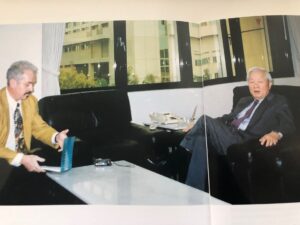
Interview with Morris Chang – The Godfather of Semiconductors in Taiwan
„Interviewing people is fascinating. But even more fascinating is doing it professionally as a journalist. I had the privilege and the opportunity to speak with and interview many interesting people during my long journalistic career. Among them were the philosopher Norbert Elias (‚We are all belated barbarians‘). The ‚Godfather of Semiconductors,‘ founder of TSMC (Taiwan Semiconductor Manufacturing Company), Morris Chang in Taiwan. Helmut Kohl, Otto von Habsburg, Ruud Lubbers, Wim Kok, Frits Bolkestein, Hans van den Broek, Freddy Heineken, Pim Fortuyn, Theo van Gogh, John de Mol, Linda de Mol, Johannes Heesters, Lale Gül (I Am Going to Live), Markus Lüpertz (‚I am a genius‘), Rudi Carrell, Leon de Winter, Richard Goldstone, Serge Brammertz, Oswald Kolle. And many CEOs of major Dutch multinationals, including; Cor Boonstra, Jan Timmer (Philips) to Jeroen van der Veer (Shell), from Jan Hommen (Philips, ING) to Pieter Elbers (KLM), Nina Brink (World Online), Cees van der Hoeven (Ahold), Arnout Loudon (Akzo Nobel), Fokke Sybesma (DSM), Wim Dik (KPN), Freddy Heineken, and Karel Vuursteen (Heineken), Hans van der Wielen (Nutricia), and Nancy McKinstry (Wolters Kluwer), one of the most successful executives/CEOs in the Netherlands, to name just a few. In Belgium and Luxembourg, I interviewed André Leysen (Agfa Gevaert, Treuhand), Wilfried Martens, Jean-Luc Dehaene, Guy Verhofstadt, Jean-Paul Votron (Fortis), Jacques Santer, Jean-Claude Juncker, and Vivanne Reding. In the Netherlands, I also had many conversations with Prince Claus, King Willem-Alexander, and Queen Maxima, some of which were off the record. So I can’t share everything from those.“
Of course, Helmut has his favorites among the interviews he conducted. The one with Morris Chang even earned him an award: the International Communications Award from Taiwan, the Republic of China! However, the interview with Wim Duisenberg is a particularly striking example. Let’s hear from Helmut again:
Wim Duisenberg
„The highlights in my interview repertoire were certainly the interviews I had with Wim Duisenberg. Particularly the interview at the French embassy in The Hague when he received the ‚Chevalier de la Légion d’honneur.‘
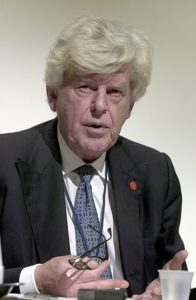
Wim Duisenberg – First President of the European Central Bank ECB
The reception in honor of Wim Duisenberg was a formal French setup. The invited guests were divided into two sections. One section for the VIPs, including Duisenberg, the French ambassador & Co., and another section for the press. Between these two sections was a kind of ‚cordon sanitaire,‘ with barriers separating the VIPs from the ‚ordinary‘ press.
Suddenly someone called out: ‚Helmut, how nice to see you!‘ A beautiful woman approached me. It was Gretta Duisenberg, Wim’s wife. Whatever one might think of Gretta, one thing is clear: she is a very spontaneous woman. Gretta gave me the customary three kisses on the cheek and said, ‚Come here…‘ She pulled me over the barriers towards the VIP section. The French security guards present dared not intervene.
We listened together to the speech – the laudation – by the French ambassador. Then it was Wim’s turn. He received the award, followed by his ‚Merci‘ – his thank-you speech.
After Wim finished his speech, I approached him: ‚Congratulations, Wim,‘ I said, shaking his hand and adding, ‚Do you have time for a short interview later when everything is over here?‘ – ‚Yes,‘ he said, ‚let’s do it!‘
So said, so done. After the event, I sat with Wim alone – just the two of us – in a room at the French Embassy in The Hague. Wim Duisenberg was then the president of the European Central Bank (ECB) in Frankfurt/Main. He was ‚Mr. Euro.‘ He was the first president of the ECB. The Euro was still young at that time. It was only introduced as a currency in 1999. And in 2002, we received the Euro coins and banknotes. The questions I wanted to ask Wim Duisenberg I had already thought out in advance. It was a short but powerful interview. Afterward, I cycled home to Balistraat. I wrote the interview directly on my computer. I was very satisfied.
The next morning. Computer on. I pulled up the interview with Duisenberg, read it through once more, and edited it. Wow – I thought suddenly, to put it in Flemish. What is Duisenberg actually saying? I read it through again carefully. It was clear: these statements by Wim Duisenberg would have a major impact on the Euro-Dollar exchange rate. I picked up the phone, I called Duisenberg. ‚Good morning, Wim. The interview is ready. As agreed, I will email it to you for authorization. You make very strong statements. These will impact the Euro-Dollar exchange rate!‘ I said to him. Wim’s response: ‚Helmut…You understand me, right?‘ Wim gave the green light for publication. The interview was first published in DIE WELT, Börsen-Zeitung (Germany), and Finanz und Wirtschaft (Switzerland) in German. It caused quite a stir. It was cited in other media. The phone rang. No, it wasn’t Wim, it was the Wall Street Journal (WSJ) in New York. ‚May we publish your interview with Mr. Duisenberg?‘ they asked from the other end of the line. So that was that, I sold the story. The WSJ published the interview with Duisenberg the next day. The phone rang again. A newspaper from Tokyo called. BINGO! The interview with Wim Duisenberg went worldwide. And the Euro exchange rate against the US Dollar rose by two cents. Then exactly what Duisenberg wanted happened.“
Prins Claus
Naturally, we also let Helmut speak for himself about his contacts with Prince Claus – for him, ‚a true friend‘:
„I took the shortest route from Germany to the Netherlands – via China. From Beijing, where I worked as a lecturer in German language and literature and as a foreign correspondent from 1983 to 1985, I moved to The Hague. In The Hague, I continued my work as an independent foreign correspondent. I reported for media in Germany, Austria, Switzerland, Luxembourg, and Belgium – and later also for Dutch media, after learning the Dutch language, which I have come to love. When I came to The Hague from Beijing, I didn’t speak a word of Dutch – except perhaps: ‚How are you?‘, ‚Goodbye.‘ or ‚I love you.‘ Immediately after starting as a foreign correspondent in the Netherlands, I joined the Foreign Press Association in the Netherlands (BPV). The extravagant and temperamental Nel Slis was then (1985) chairman of the BPV. At the annual BPV event, the New Year’s reception, which was held in Maastricht at the time, I was introduced to Prince Claus. Since my Dutch was rudimentary at the time, I memorized a few sentences. Including how to address His Royal Highness in Dutch. Thus: ‚Royal Highness, may I introduce myself?‘ I shook Prince Claus‘ hand while reciting my lines in broken Dutch with a heavy German accent. He looked at me and laughed. Then he said: ‚Mr. Hetzel, we are both Germans. We can also speak German to each other.‘ The ice was broken. It was the beginning of a good and inspiring relationship. My friendship with Prince Claus of Amsberg lasted until his death on October 6, 2002.

Prinz Claus von Amsberg (1926-2002)
A few years later, when I was elected chairman of the BPV, a prestigious position I held from 1990 to 1998, I asked Prince Claus if he would be the patron of the BPV. He responded briefly and enthusiastically: ‚Yes, gladly!‘ I invited Prince Claus to all our festive BPV annual conferences. Whether it was at the Kurhaus in Scheveningen or in Ootmarsum in Twente. He always came. But he never came alone. He was always accompanied by his eldest son Willem-Alexander, then the Prince of Orange, now the King of the Netherlands. So I got to know our current King well – and later his wife, Queen Maxima.
During the annual BPV reception at the Parkhotel De Wiemsel in Ootmarsum, I had a conversation with Prince Claus after the event – in German, as he insisted: ‚We always speak German to each other.‘ It was 1990. It was my first year as chairman of the BPV and the year after the fall of the Berlin Wall, which on November 9, 1989, brought freedom to East Germans and other countries and citizens in Central and Eastern Europe. An unforgettable event. It changed Europe and the world. We were sitting alone in the hotel, and he said: ‚I want to tell you something, but you must promise me on your honor not to publish what I tell you.‘ I gave him my hand and replied: ‚Word of honor – My honor.‘ Then he spoke, already marked by his illness, very slowly. He told me that shortly after the fall of the Wall, he had visited the still-existing GDR incognito. He had also been to Dötzingen near Hitzacker on the Elbe, where he was born and raised. He said he was shocked by the state of the then GDR. ‚Everything has collapsed.‘ And yet he had also enjoyed his incognito trip a bit.
‚It was fantastic to see my homeland again. No one recognized me!‘
That Prince Claus told me this off the record and in confidence was a great sign of trust. I kept my word and did not publish it at the time. I could have just called BILD-Zeitung or BUNTE. It would have been a major scoop, but I didn’t. My word of honor stands! Now, more than twenty years after his death, I hope he doesn’t mind me revealing his then trip to the GDR. It’s history now!“
Source:
Nieuwe of Littéraire Sociëteit De Witte – The Magazine – June 2024
Interview by Jan Rutger van Zwet, April 2024, Societeit de Witte, The Hague
Photos: Copyright © Marcia van Bijnen
Links:
https://societeitdewitte.nl/en
https://www.linkedin.com/pub/dir/Marcia/Van+Bijnen
https://www.hetzelmedia.com/the-gentleman-journalist/
https://en.wikipedia.org/wiki/Wim_Duisenberg
https://nl.wikipedia.org/wiki/Claus_van_Amsberg
www.hetzelmedia.com
www.helmuthetzel.com
www.haagsche-salon.com
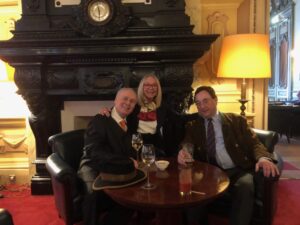
Happy times in Societeit De Witte in The Hague with Pixie and Jan Rutger – April 2024
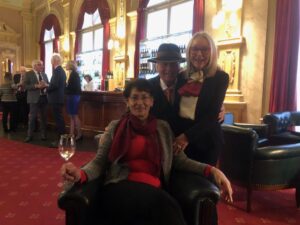
With Pixie and Marcia in Societeit De Witte The Hague, Aprl 2024

Helmut Hetzel – Thanks dear Marcia for the beautiful pictures and thanks to you dear Jan Rutger for the interview ! It was a pleasure working with you both.
Copyright © by HELMUT HETZEL / The Hague

